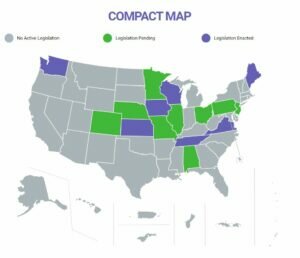
FOR IMMEDIATE RELEASE
Seventh State Approves Legislation Establishing Dental Compact
The new Dentist and Dental Hygienist Compact will increase access to care for patients by creating reciprocity, reducing red tape for licensed providers
CHICAGO, April 23, 2024 – Like other licensed professionals, dentists and dental hygienists face unnecessary costs, wait times and red tape to obtain a new license when moving from one state to another. To help these dental professionals start caring for patients immediately, seven states have passed legislation to form an interstate compact that will allow licensed dentists and hygienists to easily start practicing in other participating states.
“All over the country, dentists and dental hygienists are concerned about low staff levels that lead to long wait times for their patients,” said Linda J. Edgar, D.D.S., president of the American Dental Association. “Yet when trained, experienced dentists and hygienists move to a new state, they face the same barriers to getting a license as those who have never practiced before. The compact will help alleviate workforce challenges in these states and states that join in the future.”
The compact is the result of a years-long partnership between the Council of State Governments (CSG), the Department of Defense (DoD), the American Dental Association (ADA), the Association of Dental Support Organizations (ADSO), and the American Dental Hygienists’ Association (ADHA).
The U.S. Department of Defense provided grants for the creation of interstate compacts – including the Dentist and Dental Hygienist Compact – to address license portability affecting transitioning military spouses. Many other professions already benefit from interstate licensure compacts, including nursing, emergency medical services, physical therapy, occupational therapy and counseling.

Compact status by state from DDHcompact.org, as of 4/23/2024.
“Dental hygienists are an essential part of the dental team and are sorely needed at a time when offices everywhere are facing staff shortages,” said Becky Smith, C.R.D.H., Ed.D., president of the American Dental Hygienists’ Association. “The compact makes it easier for hygienists to move throughout the country and take positions where they’re needed most, and that means increased access to care for patients. We hope to see all 50 states choose to join the compact in the years ahead.”
Maine joins Kansas, Virginia, Tennessee, Washington, Iowa and Wisconsin in enacting the compact. Under the multi-state agreement, the Compact Commission will provide a means of porting a dentist or dental hygienist’s license from any one of these states to any of the others, rather than requiring them to repeat the long, costly licensing process to practice their profession. Legislation to join the compact is also currently under consideration in Colorado, Minnesota, Missouri, Ohio and Pennsylvania, among other states.
Compact member states will appoint a commissioner to the Compact Commission and agree to recognize dentist and dental hygienist licenses from other member states. When professionals apply for licensure portability between states, the Commission will facilitate background checks and confirm whether they are licensed to practice and in good standing before issuing compact privileges. Partners in the compact expect the first compact privileges to be issued in about one year.
The Council of State Governments will lead the process of establishing the Compact Commission once legislation from the seven states becomes law. In the meantime, member states may appoint provisional commissioners and begin meeting informally to discuss the work of the compact.
##
About the American Dental Hygienists’ Association
The American Dental Hygienists’ Association (ADHA) is the only organization representing the professional interests of the more than 220,000 dental hygienists in the United States. Dental hygienists are preventive oral health professionals, licensed in dental hygiene, who provide educational, clinical and therapeutic services that support total health through the promotion of optimal oral health. The Journal of Dental Hygiene (JDH), published bi-monthly, is ADHA’s scientific journal and flagship publication. To learn more about the ADHA, dental hygiene or the link between oral health and general health, visit adha.org.
About the American Dental Association
The not-for-profit ADA is the nation’s largest dental association, representing 159,000 dentist members. The premier source of oral health information, the ADA has advocated for the public’s health and promoted the art and science of dentistry since 1859. The ADA’s state-of-the-art research facilities develop and test dental products and materials that have advanced the practice of dentistry and made the patient experience more positive. The ADA Seal of Acceptance long has been a valuable and respected guide to consumer dental care products. The Journal of the American Dental Association (JADA), published monthly, is the ADA’s flagship publication and the best-read scientific journal in dentistry. For more information about the ADA, visit ADA.org. For more information on oral health, including prevention, care and treatment of dental disease, visit the ADA’s consumer website MouthHealthy.org
About the Association of Dental Support Organizations
The Association of Dental Support Organizations (ADSO) is a non-profit trade association whose members support more than 11,000 dentists. ADSO supports its members through research, education and advocacy; enabling them to foster innovation, collaboration and a vibrant market where DSO-supported dentists can provide quality oral health care. Visit www.theadso.org to learn more, and follow the ADSO on LinkedIn, Instagram, and X.
Media Contacts
Bronwyn Barrera, MBA
ADHA
(312) 440-8911
[email protected]
Matthew Rossetto
Legislative Liaison
ADA
[email protected]
